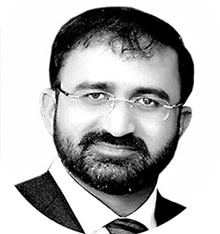Academic study of fanaticism
A disturbance of peace by several persons, assembled and acting with a common intent in executing a lawful or unlawful enterprise in a violent and turbulent manner is called riot or mob violence. Fanaticism has been in evidence across the world.
Even Pakistan has no respite from the scourge, as one saw during past decades—from the acts of terrorism across the country to attack on Sri Lankan factory manager in Sialkot. And the trend continues till date. This wave of fanaticism raises certain questions for all people of Pakistan.
There is an expression that has been ascribed to Voltaire (although he never said this in his writings, but it fittingly summarizes his attitude toward freedom of speech): UI disapprove of what you say but I will defend to the death your right to say it.
Here we do not find the conviction of having absolute truth that characterizes the fanatic, yet there is a fanatical fighting attitude for freedom of speech in this saying.
In a similar manner someone can fanatically defend someone else’s rights and could even be ready to die for them.
Harmon gives an example of the religious fervor of an ascetic or spiritual teacher that can be considered peculiar to his contemporaries but can be seen as an example of a virtuous person for future generations.
Thus fanaticism can be either good or bad depending on how and for what reasons someone acts fanatically.
For instance, religious fundamentalism can manifest itself in particular acts (for example, certain parents who are fundamentalists may raise their children strictly and use corporal punishment when their child has gone to the cinema), but not always (for example, parents who believe that going to the cinema is a sin, but they do not punish their child when s/he has attended the cinema because they hope that with God’s help their child will turn from his/her Uvealways and stop watching movies).
The origins of fanaticism are based in the mind but it always manifests itself through actions. For instance, a fanatical conservationist is not only convinced that a certain corporation is responsible for polluting the natural environment but s/he actively calls upon others to boycott the corporation and is even prepared to commit acts of terrorism to sabotage the company.
According to Colas, a fanatic does not need to discover or find the truth. S/he is led by total self-assurance. A faith community of fanatics is certain about the absolute truth of the words of their leader and they are convinced that they are the only ones authorized to interpret those words of truth.
They are proud to be chosen and hate those who do not care about the truth. The latter are regarded as doomed. This fanatical community tries to subject everyone to their truth, be it through religious or political ideology.
Deviation of the world from this truth is considered an accident that must be corrected. Fanatics are ready to sacrifice themselves for their ideas. They attack the disorder of the imperfect and unholy world.
Self-sacrificial devotion to a goal is common to all fanatics, whether their fanaticism be connected with religion, politics, and the world of entertainment, hobbies or something else.
Therefore, the fanaticism of a sport fanatic, for instance, might not be rooted in any special ideology but it manifests itself in self-sacrificial devotion to a sport or club even if in the long term this could harm his/her health or cause trauma, for example, when getting into a fight with fans of an opposing team.
A fanatical computer gamer may not consider a highly addictive game the best ever made but his/her fanaticism focuses on self-sacrificial gaming that deepens the addiction and affects his/ her health up to the point where it can even cause sudden death. Fanaticism as a particular mindset and behavioural trait is always present in human society.
Therefore, in my opinion it is justified to talk about it. Having many faces and being a universal phenomenon, fanaticism is not limited to the world of religion or politics but can be found in almost any sphere of human activity.
This is because the vehicles of fanaticism are human beings, not ideologies, even if the latter can at times induce fanaticism.
Even if not every kind of fanaticism is dangerous to society, we need to be familiar with its traits to recognize those tendencies which can lead to physical or mental violence and brutality.
I would prefer to say when I face a fanatic person, treat each person’s beliefs and practices with respect, just as you expect them to do with yours.
Be curious, and ask questions about their different beliefs (at appropriate times and settings), and offer to talk about yours. Or, if you prefer, simply and politely state that your beliefs are a private matter and that you’d prefer not to discuss them.
—The writer is an academic writer, author of five books and award-winning research presenter.










